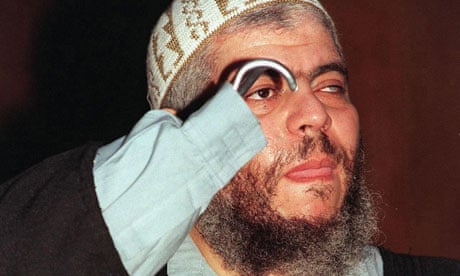Abu Hamza, the controversial Islamist cleric, has won an appeal against the government's attempts to strip him of his British passport, a special tribunal ruled today.
Solicitors for the former imam of Finsbury Park mosque in north London argued that such a move would render him "stateless" as he had already been stripped of his Egyptian citizenship. It is not expected that the move will hinder US authorities who wish to extradite Hamza on terrorist charges.
Hamza, 52, was jailed in Britain for seven years in February 2006 for inciting murder and race hate. With his firebrand-style and a hand replaced by a hook, he is regarded by some commentators as the international face of Islamist extremism in Britain.
Delivering the 12-page ruling to the Special Immigration Appeals Commission (Siac), Mr Justice Mitting said: "We are satisfied on balance of probabilities that if a deprivation order were to be made, the appellant [Hamza] would be made stateless. The conclusions which we have reached in the closed judgment supplement, but do not contradict, that conclusion. Accordingly, this appeal is allowed."
Hamza is in Belmarsh prison in south-east London as he challenges attempts to extradite him to the US on terror charges. That case was delayed by the European court of human rights in Strasbourg in July, which called for further submissions over the length of his sentence and the conditions he would experience if extradited to ADX Florence, a so-called "supermax" prison in Fremont County, Colorado.
The previous government had wanted him sent to the US before his jail term had been completed, but the extradition was halted after his lawyers went to the European court. Attempts to take his passport away were launched in 2003 but delayed by other legal actions against him.
At a three-day hearing in London last month, Hamza's lawyers argued he has already been stripped of his Egyptian citizenship so could not have his British passport taken too, as that would render him "stateless".
The Home Office argued that there was no documentation to prove he was no longer an Egyptian national and though he was once denied an Egyptian passport, he was later allowed one.
The commission heard Hamza may have had his Egyptian nationality revoked but the country's government would not confirm whether he had or not.
The cleric came to Britain on a student visa and acquired a British passport through marriage. He was denied an Egyptian passport in 1982 because he had not undertaken military service, the panel heard, but a decree in 1988 allowed him his citizenship back.
But Egyptian law expert Sabah Al-Mukhtar, appearing as a witness for Hamza's legal team, told the commission it was possible he had been stripped of his nationality later on for other reasons.
He said by refusing Hamza a passport the Egyptian government was giving a "de facto" denial of his nationality. The panel heard that under Egyptian nationality laws, a citizen cannot obtain a foreign nationality without government permission. If they do, that nationality may not be recognised by the Egyptian government.
Mitting ruled it was unclear whether Hamza was stripped of his Egyptian nationality before or after the then-home secretary David Blunkett gave notice of his intention to strip the radical cleric of his British citizenship on 4 April 2003.
But he said the panel heard from experts who "had very good grounds for believing, and did believe, that a decree had been issued, probably unpublished, which effectively stripped the appellant (Hamza) of his (Egyptian) nationality".
Mitting went on: "All that we can be satisfied about, on balance of probabilities, is that a decree has been issued and that its effect is to deprive the appellant of Egyptian nationality. It is immaterial that the decree was almost certainly issued after the then secretary of state gave notice of his intention to deprive the appellant of his British citizenship on April 4 2003.
"Because the secretary of state cannot make a deprivation order until his appeal has been determined, Siac must take into account all relevant facts and circumstances, whether they occurred before or after notice was given."
The US has had to give written assurances that it will not impose the death penalty or place Hamza before Guantánamo Bay-style military tribunals.
The US alleges Hamza was in contact with Taliban and al-Qaida terrorists and aided the hostage-taking of 16 western tourists in Yemen in December 1998 that ended in the deaths of three Britons. He is also charged with attempting to set up a training camp for "violent jihad" in Oregon in 1999.
